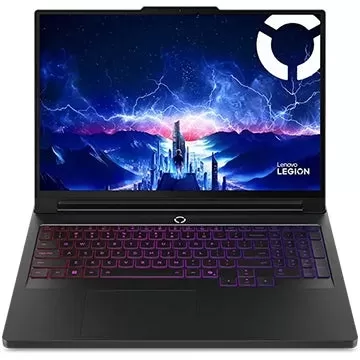Preorder Lenovo Legion Pro 7i Gen 10 with RTX 5080 for 2025
Lenovo has opened preorders for its highly anticipated Lenovo Legion Pro 7i Gen 10 gaming laptop, set to redefine gaming standards in 2025. This powerhouse machine boasts the latest cutting-edge Intel processor and Nvidia graphics card, paired with a stunning high-resolution OLED display and ample RAM and SSD storage right out of the box. Although listed as a preorder, the Lenovo Legion Pro 7i Gen 10 is already beginning to ship, with deliveries expected as early as late April.
New Release: Lenovo Legion Pro RTX 5080 Gaming Laptop

Lenovo Legion Pro 7i Gen 10 16" 2560x1600 OLED Intel Core Ultra 9 275HX RTX 5080 Gaming Laptop with 32GB RAM, 2TB SSD
$3,599.99 at Lenovo
The Lenovo Legion Pro 7i Gen 10 is packed with top-tier specs, featuring a 16" 2560x1600 240Hz OLED display, Intel Core Ultra 9 275HX CPU, Nvidia GeForce RTX 5080 GPU, 32GB of DDR5-6400MHz RAM, and 2TB (2x1TB) of SSD storage. The Intel Core Ultra 9 275HX significantly outperforms the previous generation's Core Ultra 9 185H, which prioritized energy efficiency over raw power. This new processor is a true successor to the i9-14900HX and perfectly complements the GeForce RTX 5080 mobile GPU.
The Legion Pro 7i also comes with the latest connectivity options, including WiFi 7 and Bluetooth 5.4 support, USB Type-C with up to 140W of Power Delivery, Thunderbolt 4 with DisplayPort 2.1 (40Gbps), and a USB Type-A port with USB 3.2 Gen 2. It retains the increasingly rare RJ45 ethernet port and includes a privacy shutter for the webcam. The laptop's chassis, made of aluminum and magnesium, ensures durability and a premium feel.
We've reviewed an RTX 5080 equipped gaming laptop
Although we haven't yet tested Lenovo's newest generation Legion laptop, we have reviewed a gaming laptop equipped with the RTX 5080 GPU. The RTX 5080 offers only a slight edge over the RTX 4080 in raw rasterized performance but significantly excels when games support DLSS 4.0 with multi-frame generation. The Gigabyte Aorus Master laptop, equipped with an RTX 5080 with a 150W TGP rating and a 2560x1600 display, provides a good benchmark for the Lenovo Legion Pro 7i, which shares the same TGP rating and resolution display, suggesting comparable gaming performance.
Gigabyte Aorus Master 16" RTX 5080 Laptop Review by Chris Coke
"Nvidia has been vocal about integrating AI capabilities into its 50-series GPUs, rather than focusing solely on native rendering performance. While the RTX 5080's performance is disappointingly close to that of the RTX 4080, this gap narrows significantly when playing games that support multi-frame generation. Although 'fake frames' have become a meme, their impact can be impressive, dramatically enhancing performance when implemented well. However, the effectiveness can vary between games; for instance, Alan Wake 2 may feel laggy at higher multiplier settings, whereas Cyberpunk 2077 does not. With future technologies like neural shaders on the horizon, investing in these new GPUs is a bet on future game support and enhancements. You're essentially buying into a promise as Nvidia and game developers work to integrate these features into new and existing titles."
-
HBO's Harry Potter TV series has reached a major casting milestone with the first six roles officially announced. While fans eagerly await reveals for Harry, Ron, Hermione, and Voldemort, we now know who will portray Albus Dumbledore, Minerva McGonagAuthor : Gabriel Dec 22,2025
-
The meteoric rise of Marvel Rivals, NetEase's multiplayer game, has been met with both praise and legal trouble. Although the game rapidly attracted millions of players, its success has been shadowed by serious legal issues for the developer.In JanuaAuthor : Violet Dec 22,2025
- Spring Valley Farm Game: January 2025 Redeem Codes
- WWE Superstars Join Call of Duty Warzone: Mobile Roster
- Midnight Girl is a minimalist point-and-click adventure set in Paris in the 60s, now open for pre-orders on mobile
- Mobile Legends: Bang Bang – Best Lukas Build
- "Grand Outlaws Unleashes Chaos and Crime on Android Soft Launch"
- Video Game Song Surpasses 100 Million Streams on Spotify






















